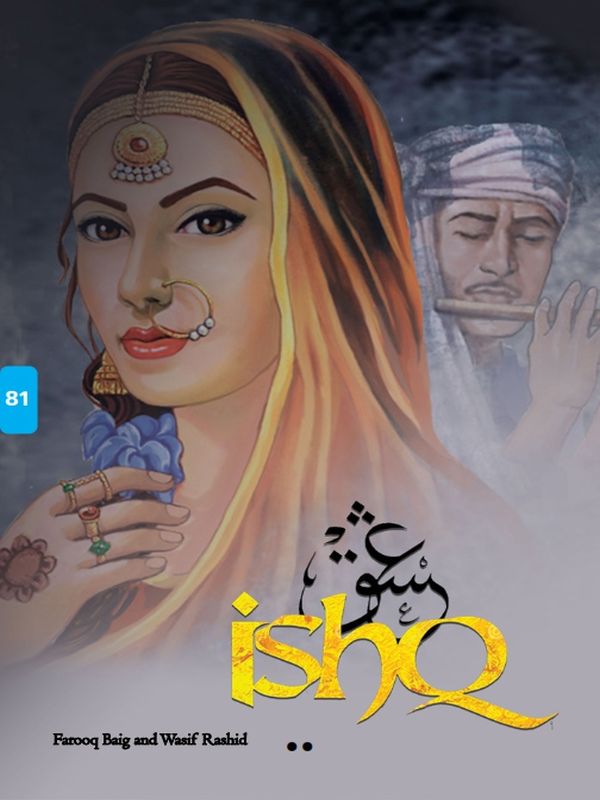Ishq
Serendip
The history of Heer Ranjha has been a part of our childhood, often narrated as a lesson in’ True Love’. However, by the time we finished school, Shakespeare’s Romeo and Juliet had taken over our imaginary senses and perspectives.
The tale of Heer Ranjha is a Sufi narrative/spiritual journey of separation and seeking reunification. The story of Heer Ranjha represents the greatest of all passionate loves: Ishq – the love of the Creator, which is absolute and pure.
In addition to the above, a particular aspect of the story appealed to me; It was how Heer challenged a patriarchal society and shook it to its foundations. It was about emancipation, gender, equality, freedom, free speech and choices – all the rights accorded to a woman in Islam.
The journey to put Ishq together has been an experiment and an exercise in building bridges between diverse cultures, working out their creative differences, and dealing with financial and time constraints – an interpretation of Heer Ranjha as a celebration of 70 years of Pakistan’s Independence, which was being celebrated in 2017.
It was the first time we had an opportunity to tell the story our way through the thoughtful and engaging script we meticulously prepared with Murshid. We used Punjabi colloquialisms and set the story against the beautiful backdrop of Punjab. We combined classical and modern dance with a unique blend of poetry and fusion music. The most exciting aspect of this was working with two different composers. Finding that music producers work from a completely different perspective in London proved a big challenge.
We had commissioned Ian Brandon to compose the first song of the play. We hadn’t received anything, and as time was of the essence, I rang him a week later and asked: ‘Where is the song’? ‘It’s in your e-mail,’ he replied calmly. Hurriedly searching e-mail, I was horrified to find it was a music sheet – a jumble of symbols, lines and numbers. When I quizzed him further about the music and who would sing the song, I was informed that I would have to get an orchestrator and a singer to bring it all together. In the end, it took thirty-four people to produce one song. This was not how we did things in Pakistan – we just told a composer to compose a song, and he or she gave us a disc the following day, no questions asked. So these differences were really marked.
Now to the main reasons why we wanted to do Ishq. Three were threefold: the first was to tell our own stories, of course; the second was to show the diversity of the cast that we chose for this play, to show what integration was all about; and thirdly, and most significant was to bring home to young Pakistanis that they have to start making their music, writing their musicals, producing the music, and the whole thing as homegrown production. What we have seen so far in Pakistan, which I feel has been a great disservice to generations, is the quality of the musicals that have been presented. These are plagiarised without concern or respect for production values – a script and music hurriedly composed, and the plate is put together by what people have seen on a visit abroad. Then there are always CDs to plagiarize. With Ishq, we wanted to show the entire process of how a musical really should be put together.
We are in conversation with a gentleman called Dave, who’s written a very valuable book on how to put musicals together. We intend to bring these people to Pakistan to help us and to school our young generations so that we can start telling our stories. We need people to change the West’s mindset towards our fables and stories.
They say that Shakespeare plagiarised Heer Ranjha as Waris Shah preceded the Bard by almost 300 years when he wrote his famous Heer. Shakespeare was not averse to ‘borrowing’ stories from here and there, like Anthony and Cleopatra, and many others.
So I think we manage to cover the first two of three points, and the third is in the pipeline. Hopefully, Ishq will give enough motivation to the younger generation to start getting ready for the next generation.
Why did I choose Ishq as a title and not Heer Ranjha or Love of Heer Ranjha? It was because I heard this very beautiful song called Ishq:
Ishq ki Ibtida bhi To;
(You are the Beginning of Love;)
Hussan ki Intiha Hi to;
(You are the Acme of Beauty;)
Rehno Do, Raaz Khul Gaya;
(Leave it; the secret is out;)
Banday Bhi Tum, Khuda Bhi Tum;
(You are the Man in God, And the God in Man.)
No word in the English dictionary translates the word Ishq, and I think the above poetry does the play tremendous justice. What could have served to sum up the essence of what Ishq is all about?




